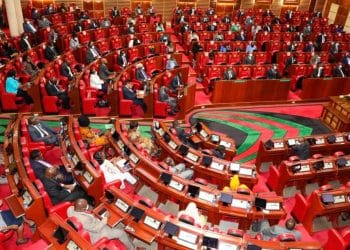Justin Muturi, the head of the Democratic Party of Kenya, has called out President William Ruto for allegedly using the recently signed Computer Misuse and Cybercrimes (Amendment) Act, 2025, to stifle the voices of citizens.
On Friday, October 24, 2025, Muturi shared in a press statement that the law wasn’t really about tackling digital crime. Instead, it seemed aimed at stifling free expression and going after vocal Kenyans, especially the younger crowd.
Muturi called the legislation a “law against courage”, saying it was designed to scare citizens who dare to question authority.
“Hey, can someone let President William Ruto know that Kenyans aren’t easily fooled?” Let’s be real about this. The Computer Misuse and Cybercrimes (Amendment) Act, 2025, isn’t really a law aimed at tackling crime. It’s like a rule that goes against bravery. It’s the newest tool in a fearful government’s kit, designed not to keep people safe but to hush them up.
He mentioned that the law isn’t aimed at hackers or online fraudsters but rather at “a generation that dares to speak truth to power without permission, without fear, and without a price tag,” according to Justin Muturi.
Muturi said that the amendment was really about trying to stifle Kenya’s Gen Z movement, which has been stepping up and challenging political power through social media activism.
“This law wasn’t made for criminals; it’s meant for citizens.” It was meant to safeguard the regime, not the country. It was really aimed at the sons and daughters of this country, the Gen Zs who came up from dorm rooms, backstreets, and online spaces to challenge the status quo.
Hey, don’t forget to check this out too: The government is standing by the Cybercrimes Law, assuring everyone that it won’t restrict free speech. He said the government is scared of a generation that can come together without relying on tribal politics or party money.
“They noticed a generation that can rally together in just hours, not months.” “There’s a generation out there that doesn’t need bribes to get ahead or anyone’s permission to voice their thoughts, and that really freaked them out,” he said.
“So, here’s the deal: this law feels like a cowardly move to try and trap real bravery.” President William Ruto was in Laikipia on Thursday for the burial of Police Inspector General Douglas Kanja’s father.
He took the opportunity to defend the law, explaining that it’s designed to protect Kenyans from online harm, radicalism, and cyberbullying. “The law is stepping up to tackle new digital threats that have caused real harm to society,” Ruto said.
“Let’s chat about religious extremism, online manipulation, and the damage that social media bullying can cause.” “We really need to look out for Kenya.” He argued that the legislation is really about a bigger push to enhance digital governance while still respecting our constitutional freedoms.
“We really need to stand up to these threats and keep our nation safe,” he said. Muturi, on the other hand, brushed off those reassurances, claiming that the law is just “the digital extension of dictatorship.” He encouraged Kenyan youth to see it as “a confession of fear by a failed leadership.”


















